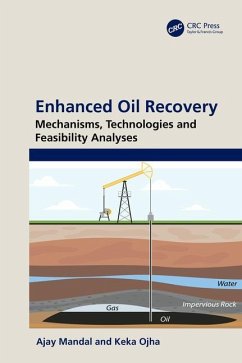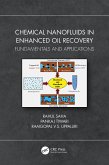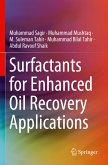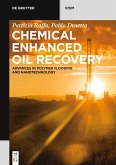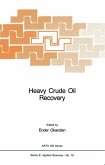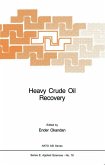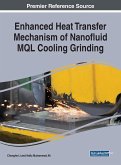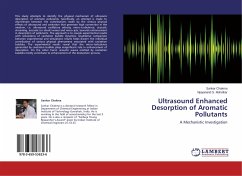- Gebundenes Buch
- Merkliste
- Auf die Merkliste
- Bewerten Bewerten
- Teilen
- Produkt teilen
- Produkterinnerung
- Produkterinnerung
This book describes different conventional Enhanced Oil Recovery (EOR) methods and their mechanisms along with present scenario of different EOR processes both at the field application and research stages. It includes chemical EOR, nanotechnology in EOR, low salinity water flooding, ECBM and enhanced recovery techniques for shale oil/gas.
Andere Kunden interessierten sich auch für
![Chemical Nanofluids in Enhanced Oil Recovery Chemical Nanofluids in Enhanced Oil Recovery]() Rahul SahaChemical Nanofluids in Enhanced Oil Recovery127,99 €
Rahul SahaChemical Nanofluids in Enhanced Oil Recovery127,99 €![Surfactants for Enhanced Oil Recovery Applications Surfactants for Enhanced Oil Recovery Applications]() Muhammad SagirSurfactants for Enhanced Oil Recovery Applications75,99 €
Muhammad SagirSurfactants for Enhanced Oil Recovery Applications75,99 €![Chemical Enhanced Oil Recovery Chemical Enhanced Oil Recovery]() Patrizio RaffaChemical Enhanced Oil Recovery74,99 €
Patrizio RaffaChemical Enhanced Oil Recovery74,99 €![Heavy Crude Oil Recovery Heavy Crude Oil Recovery]() Heavy Crude Oil Recovery115,99 €
Heavy Crude Oil Recovery115,99 €![Heavy Crude Oil Recovery Heavy Crude Oil Recovery]() E. Okandan (Hrsg.)Heavy Crude Oil Recovery115,99 €
E. Okandan (Hrsg.)Heavy Crude Oil Recovery115,99 €![Enhanced Heat Transfer Mechanism of Nanofluid MQL Cooling Grinding Enhanced Heat Transfer Mechanism of Nanofluid MQL Cooling Grinding]() Changhe LiEnhanced Heat Transfer Mechanism of Nanofluid MQL Cooling Grinding288,99 €
Changhe LiEnhanced Heat Transfer Mechanism of Nanofluid MQL Cooling Grinding288,99 €![Ultrasound Enhanced Desorption of Aromatic Pollutants Ultrasound Enhanced Desorption of Aromatic Pollutants]() Sankar ChakmaUltrasound Enhanced Desorption of Aromatic Pollutants36,99 €
Sankar ChakmaUltrasound Enhanced Desorption of Aromatic Pollutants36,99 €-
-
-
This book describes different conventional Enhanced Oil Recovery (EOR) methods and their mechanisms along with present scenario of different EOR processes both at the field application and research stages. It includes chemical EOR, nanotechnology in EOR, low salinity water flooding, ECBM and enhanced recovery techniques for shale oil/gas.
Hinweis: Dieser Artikel kann nur an eine deutsche Lieferadresse ausgeliefert werden.
Hinweis: Dieser Artikel kann nur an eine deutsche Lieferadresse ausgeliefert werden.
Produktdetails
- Produktdetails
- Verlag: CRC Press
- Seitenzahl: 348
- Erscheinungstermin: 29. November 2023
- Englisch
- Abmessung: 260mm x 183mm x 23mm
- Gewicht: 850g
- ISBN-13: 9780367566678
- ISBN-10: 0367566672
- Artikelnr.: 68715173
- Herstellerkennzeichnung
- Libri GmbH
- Europaallee 1
- 36244 Bad Hersfeld
- gpsr@libri.de
- Verlag: CRC Press
- Seitenzahl: 348
- Erscheinungstermin: 29. November 2023
- Englisch
- Abmessung: 260mm x 183mm x 23mm
- Gewicht: 850g
- ISBN-13: 9780367566678
- ISBN-10: 0367566672
- Artikelnr.: 68715173
- Herstellerkennzeichnung
- Libri GmbH
- Europaallee 1
- 36244 Bad Hersfeld
- gpsr@libri.de
Ajay Mandal is presently working as Professor in the Department of Petroleum Engineering, Indian Institute of Technology (Indian School of Mines), Dhanbad. Earlier he served as head of the Department and Associate Dean (Research & Development) of the Institute. He is having experience as Faculty of Petroleum Engineering in this Institute for more than 15 years. Dr. Mandal received his B.Sc in Chemistry (Hons) with Bronze medal from Calcutta University and B.Tech. in Chemical Engineering from the same University. He was awarded Gold Medal as the best student in Master's Degree in Chemical Engineering from Jadavpur University, India. He obtained his PhD degree from Indian Institute of Technology, Kharagpur in Chemical Engineering. Currently Dr. Mandal is involved in intense research in the field of reservoir engineering with specialization enhanced oil recovery and gas hydrates. The outcome of his research is reflected in 220 research papers, books and book chapters with more than 8500 citations. Dr. Mandal has worked on 19 sponsored R&D projects mostly on enhanced oil recovery and 11 consultancy projects from different Government funding agencies as well as E & P companies operating in India. He is also reviewer of more than 20 Journals in his specialized area. Dr. Mandal was conferred on various national and international awards like 2015 SPE South Asia Regional Distinguished Achievement Award for Petroleum Engineering Faculty; IIChE (Indian Institute of Chemical Engineers) Award for the Year 2017 (ONGC Award for Excellence in Design and Development of Oil/Gas Related Process Plant and/or Chemicals); 2019 SPE Reservoir Dynamics and Description Regional Award for South Asia and Pacific region; The Inder Mohan Thapar Foundation (IMTF)" Research Award from IIT(ISM) for the year 2016-17, 17-18 and 18-19 (Jointly with PhD students); He is a recipient of prestigious DAAD Fellowship of Germany in 2008. Dr. Mandal guided 22 Doctoral students and 6 students are currently pursuing their PhD program. He was directly involved into the fields during deputation to Institute of Reservoir Studies, ONGC under Industry-Academic interaction program for 1 year. Dr. Mandal carried out collaborative research work with Department of Petroleum Engineering, Institute of Curtin University of Technology under the Australia-India Joint Research Program, 2016. He is enriched with diversified experienced through collaborative research with University Technology of Petronas, Malaysia and National University Singapore. Dr. Mandal is a member of Enhanced Recovery Screening committee of Ministry of Petroleum and Natural Gas, Govt. of India. He Ranked within top 1% in the field of energy by an independent study done by Stanford University scientists in 2020. Dr. Mandal is admitted as Fellow of Royal Society of Chemistry for his outstanding performance in petroleum Chemistry. He is also an active member of Society of Petroleum Engineers (SPE), USA and Indian Institute of Chemical Engineers (IIChE), India. Keka Ojha is a professor in Petroleum Engineering at Indian Institute of Technology (ISM), Dhanbad India and teaching various courses of Reservoir Engineering and Unconventional Hydrocarbon Resources since 2005. At present, she is the Head of the Department of Petroleum Engineering. Prof. Ojha holds PhD and M. Tech Degrees in Chemical Engineering from Indian Institute of Technology, Kharagpur, prior to her B.Ch.E degree (Hons) from Jadavpur University in Chemical Engineering. She worked as a post-doctoral fellow from University of Notre Dame University, USA before joining IIT(SIM), Dhanbad. Dr. Ojha has published 84 peer reviewed papers in journals of repute besides conference publications of similar volume and a book, which are the outcome of about 25 R &D and consultancy projects on EOR, fracturing fluids, Coalbed Methane, Water Shut-off jobs, Shale Gas in addition to a number of EDP courses offered to the executives of various E & P companies operating in India. She is an active member of various national and International professional bodies including SPE-USA, MGMI, IIChE. Dr. Ojha is a member of the editorial board of one of the journal and an active reviewer of various petroleum engineering related journals of her research area under various other publishers. Her academic knowledge is enriched with field experience during one year deputation program in ONGC as well as academic collaborations with Curtin University, Unversiti Teknology Petronas, National University, Singapore. Contribution of Dr. Ojha in petroleum engineering academics is recognized by SPE through "2019 SPE South Asia Regional Distinguished Achievement Award for Petroleum Engineering Faculty". She and her research team bagged the first winner prize for presentation in conferences for a number of occasions.
1: Introduction to Enhanced Oil Recovery. 2: Fundamentals of Immiscible
Fluid Displacement Processes. 3: Chemical Flooding. 4: Miscible Flooding.
5: Thermal Recovery Processes . 6: Application of Nanotechnology in EOR. 7:
Other EOR Methods. 8: Low salinity Waterflooding. 9: Techno-economic
Feasibility Analysis. 10: Profile Modification and Water Shutoff.
Fluid Displacement Processes. 3: Chemical Flooding. 4: Miscible Flooding.
5: Thermal Recovery Processes . 6: Application of Nanotechnology in EOR. 7:
Other EOR Methods. 8: Low salinity Waterflooding. 9: Techno-economic
Feasibility Analysis. 10: Profile Modification and Water Shutoff.
1: Introduction to Enhanced Oil Recovery. 2: Fundamentals of Immiscible
Fluid Displacement Processes. 3: Chemical Flooding. 4: Miscible Flooding.
5: Thermal Recovery Processes . 6: Application of Nanotechnology in EOR. 7:
Other EOR Methods. 8: Low salinity Waterflooding. 9: Techno-economic
Feasibility Analysis. 10: Profile Modification and Water Shutoff.
Fluid Displacement Processes. 3: Chemical Flooding. 4: Miscible Flooding.
5: Thermal Recovery Processes . 6: Application of Nanotechnology in EOR. 7:
Other EOR Methods. 8: Low salinity Waterflooding. 9: Techno-economic
Feasibility Analysis. 10: Profile Modification and Water Shutoff.

